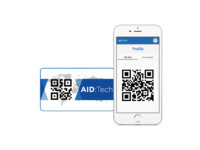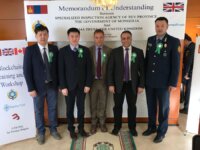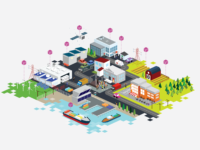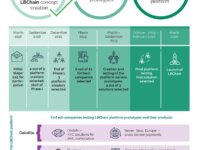This innovation was developed in order to help to prevent interferences, providing a solution for booking frequencies in the general authorization bands.
The main innovation is that this solution is based on the blockchain technology, and open to everybody. This way, our solution guarantees the integrity, the immutability, the transparency, the traceability, the audibility of the reservations of frequencies.
Case Study Library
Where innovations are collected and shared to disseminate and replicate good ideas

Innovations:
0
This website, as well as any data and map included herein, are without prejudice to the status of or sovereignty over any territory, to the delimitation of international frontiers and boundaries and to the name of any territory, city or area.
The Specialized Inspection Agency of Tuv Province and the Government of Mongolia Feasibility Study and piloted a project called “Counterfeit drug detection using Blockchain and AI” to eliminate fake drugs from the market, and save the thousands of lives. The project will increase safety and transparency of the drug industry, tracing the pharmaceutical supply chain in Mongolia, as well as globally.
Case Study
Transforming International Remittance for Serbian Diaspora using Blockchain and Digital Identity

AID:Tech’s blockchain remittance solution offers affordable, transparent money transfer services to users in and outside of Serbia. Implementation partners, senders and recipients gain traceability over the remittance process with fees >3%; in line with UN SDG 10.C
The solution is developed in partnership with UNDP Serbia and part-funded by The Rockefeller Foundation. The solution launched in September 2018 with the support of the city administration of Nis, Serbia.
Blockchain is transforming the world and we created the first pilot to experiment with this technology, promoting this transformation in the Colombian State entities making it more efficient, transparent and agile. We seek to accompany and promote projects that generate better services and processes within the entities; learning and documenting the entire process.
In response to the Australian Government’s National Blockchain Roadmap the Blockchain Excise Platform digitises and tracks a taxable commodity (in this case pure litres of alcohol). It connects producers and regulator with real-time access to new data, generating productivity benefits and reducing illicit activity. A first of its kind blockchain ecosystem connecting the regulator to industry to more effectively control the movement, transfer and payment of liabilities for an excise commodity.
The European Commission led #Blockchain4EU as a forward-looking exploration of existing, emerging and potential Blockchain and other DLTs (Distributed Ledger Technologies) applications for industrial sectors. Through an experimental and participatory approach, this project allowed first to come up with an overview of promising applications across industries, and second to co-design five prototypes that physically showcase how Blockchain could be applied in the near future.
Case Study
Harnessing the potential of blockchain technology for due diligence and sustainability in cotton…
The United Nations Economic Commission for Europe (UNECE) has developed an open source blockchain system to advance responsible consumers’ choices and business conduct in the cotton market. Through the system, industry actors can track and trace sustainability and circularity claims for cotton made clothing, from field to shelf, based on the UN standard for traceability and transparency of value chains.
LBChain is a blockchain-based technological sandbox which combines regulatory and technological infrastructures and allows start-ups to test their business solutions in a controlled environment. The platform will enable start-ups to gain new knowledge, carry out blockchain-oriented research, test and adapt blockchain-based services and offer state of-the-art innovations to their customers.
The municipality of Zuidhorn (now Westerkwartier) created the Child Package, based on the principles of Blockchain. The Child Package is a scheme intended for children from low-income households. Residents can log in on a website and use a QR-code to pay for child products at participating regional businesses.
The Korea Power Exchange (KPX) set students and parents as policy targets and systematically connected electricity-saving activities with the performance of volunteer hours which reflected in grades of school students. This program, which estimates electricity savings as a service rather than money, is leading to changes in consciousness that are perceived as social values in the future. The People's Virtual Power Plant will eventually be fused with advanced technology (blockchain, AI, big data)…





